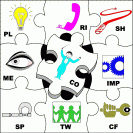
Team Development at Ductil AirLiquide Welding
This is a good example of how to apply the Belbin Team Roles Theory within teams and across teams. It included a first training intervention and a follow up. The development of participants was facilitated by an individual evaluation done through self-perception and observers’ assessment that was performed at the beginning of the project.
In 2003 DUCTIL SA was the leader of the Romanian market for metal welding and cutting products with an annual sales turnover of 24 million Euros. The company was part of the AirLiquide Group with headquarters in France, the leader of the European market and number three worldwide in the field of industrial and medical gases.
The first part of the Team Development project consisted of 4 training sessions involving a number of 60 employees from the main departments of the company: Sales, Marketing, Logistics, Production, Quality Assurance, Finance, IT and HR. The training program was based on the practical application of the Belbin Team Roles Theory and allowed participants to:
- get familiar with the concept of Team Roles;
- understand the individual Team Role profile through self perception and observers assessment;
- share this information with colleagues, give and receive feedback, learn about the Team Role profiles of the other team members;
- test and apply in practice the utilisation of Belbin Team Development technique through interactive exercises and a team game;
- analyse the balance of the participating teams, discuss ways of improving team performance and dynamics;
- establish directions for self development.
The training sessions were supported by the use of INTERPLACE software, the Team Role Expert System developed by Belbin Associates, UK.
After successfuly finalising the four training sessions ROSS Consultants and Ductil agreed to undertake a follow up session in September 2004. This session was attended by the members of the leadership team and approached the following topics:
- a review of the main methods of applying team role information at work;
- what are the learning points from the training program?;
- how can team role information be used when analysing staff performance?;
- what are the strengths and weaknesses of the team?;
- what are the team role requirements based on team objectives and organisational context?;
- what should be the individual objectives for self development?;
- how will the managers and the organisation support this development?;
- what are the decisions that can be made as a result of this project?
Some opinions expressed by the participants to this project are presented bellow:
- “To me this was a new and interesting approach to teamwork as it helped me undertand my role and the role of my colleagues” – Cristina Ionita, Marketing Specialist;
- “I appreciated the presentation and the approach of the program, the climate during the session and mostly the fact that we succeeded to understand ourselves and each other better” – Mihail Curelea, Production Manager;
- “…to discover through your perception and through the perceptions of colleagues the different aspects of your personality of which you are not very much aware or to whom you do not pay too much attention. It is interesting to see that these are the ones that matter. And why not, they can be very useful” – Florentina Florescu, Marketing Specialist;
- “I appreciate the very idea, the concept and the fact that it helps you analyse things, all from a different perspective” – Tiberiu Visan, Business Development Manager;
- “I liked it, I recognised myself in all that has been said. My colleagues perceived me the same as I did and this encourages me to continue in the same way. This is an evaluation system that is objective and easy to apply” – Maria Diaconescu, Quality Asurance Manager;
- “This training program allowed participants to see themselves through several mirrors. It offered the opportunity and the instrument to identify the differences in perception in relation to the actions and roles undertaken and to spot the most present communication issues” – Liliana Mihaila, Database Administrator.
